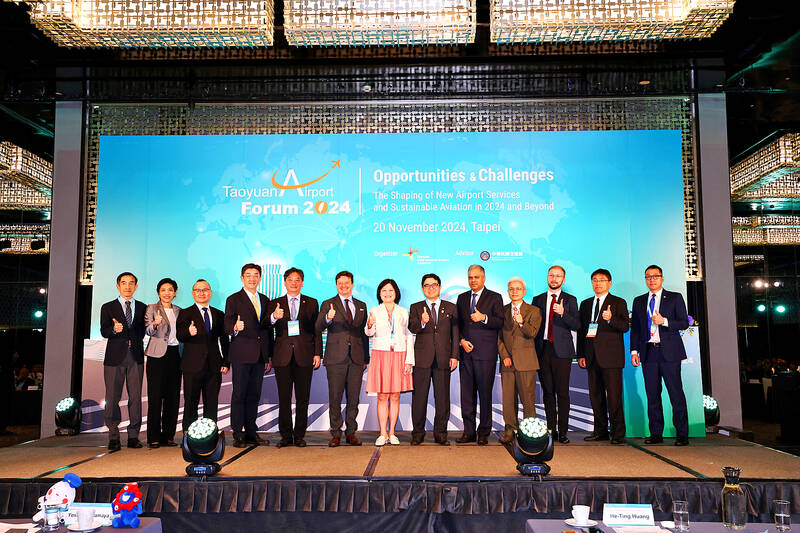At this year’s Taoyuan Airport Forum in Taipei yesterday, speakers focused on the airport’s continuing evolution, from improving the passenger experience to green energy goals.
Officials from Taoyuan International Airport Corp (TIAC), the Ministry of Transportation and Communications and international guests all highlighted the efforts made by the airport as it adapts to global trends.
TIAC has invested NT$5.2 billion (US$160 million) on 22 projects to improve efficiency and services, Ministry of Transportation and Communication (MOTC) Chief Secretary Huang He-ting (黃荷婷) said.

Photo courtesy of Taoyuan International Airport Corp
The airport, the gateway to Taiwan for most international travelers, is working to improve the passenger experience, with services remaining unaffected during the construction period, she added.
The airport is also improving conditions for its employees, Huang said, citing its recent decision to offer elderly care services for employees’ family members.
The airport has expanded its network of international partners to 240 and is ready to continue its positive sustainable development to connect Taiwan to the world, TIAC Vice President Lee Chun-te (李俊德) said.
Last year, Taoyuan airport joined more than 50 other airports from the region in pledging net zero carbon emissions by 2050, Airports Council International (ACI) Director General of Asia-Pacific and Middle East Stefano Baronci said.
Taoyuan airport is also part of ACI’s Airport Carbon Accreditation program, he added.
Baronci also highlighted emerging technology like artificial intelligence and “smart” infrastructure as areas of important future development that airports around the world are focused on.
“There is value in connectivity,” he said in response to a question about the airport’s future development, adding that there is potential for the airport to expand its personalized services to passengers as a way of enhancing travel experiences.
Kansai Airport CEO Yoshiyuki Yamaya spoke on his airport’s moves to lessen its environmental impact, such as solar panels, hydrogen-powered vehicles, and decreasing its water usage.
Taoyuan International Airport special report

Taiwan is stepping up plans to create self-sufficient supply chains for combat drones and increase foreign orders from the US to counter China’s numerical superiority, a defense official said on Saturday. Commenting on condition of anonymity, the official said the nation’s armed forces are in agreement with US Admiral Samuel Paparo’s assessment that Taiwan’s military must be prepared to turn the nation’s waters into a “hellscape” for the Chinese People’s Liberation Army (PLA). Paparo, the commander of the US Indo-Pacific Command, reiterated the concept during a Congressional hearing in Washington on Wednesday. He first coined the term in a security conference last

Prosecutors today declined to say who was questioned regarding alleged forgery on petitions to recall Democratic Progressive Party (DPP) legislators, after Chinese-language media earlier reported that members of the Chinese Nationalist Party (KMT) Youth League were brought in for questioning. The Ministry of Justice Investigation Bureau confirmed that two people had been questioned, but did not disclose any further information about the ongoing investigation. KMT Youth League members Lee Hsiao-liang (李孝亮) and Liu Szu-yin (劉思吟) — who are leading the effort to recall DPP caucus chief executive Rosalia Wu (吳思瑤) and Legislator Wu Pei-yi (吳沛憶) — both posted on Facebook saying: “I

Sung Chien-liang (宋建樑), who led efforts to recall Democratic Progressive Party (DPP) Legislator Lee Kun-cheng (李坤城), was released on bail of NT$80,000 today amid outcry over his decision to wear a Nazi armband to questioning the night before. Sung arrived at the New Taipei District Prosecutors’ Office for questioning in a recall petition forgery case last night wearing a red armband bearing a swastika, carrying a copy of Adolf Hitler’s Mein Kampf and giving a Nazi salute. Sung left the building at 1:15am without the armband and covering the book with his coat. Lee said today that this is a serious

The Ministry of Economic Affairs has fined Taobao NT$1.2 million (US$36,912) for advertisements that exceed its approved business scope, requiring the Chinese e-commerce platform to make corrections in the first half of this year or its license may be revoked. Lawmakers have called for stricter enforcement of Chinese e-commerce platforms and measures to prevent China from laundering its goods through Taiwan in response to US President Donald Trump’s heavy tariffs on China. The Legislative Yuan’s Finance Committee met today to discuss policies to prevent China from dumping goods in Taiwan, inviting government agencies to report. Democratic Progressive Party Legislator Kuo Kuo-wen (郭國文) said